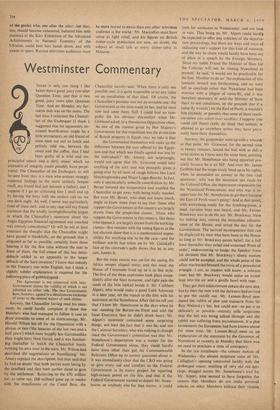Westminster Commentary
THERE is only one thing I like better than a good, juicy row after Question Time, and that is two good, juicy rows after Question Time. And on Monday my fav- ourite dish was on the menu. The last time I criticised the Chancel- lor of the Exchequer (1 think I suggested that his apparently im- minent beatification might be a little premature), an old friend of mine took me out to lunch and politely told me, between the sweet and the coffee, that I had been guilty of a wild and un- principled attack and a dirty smear which no journalist of integrity could possibly have perpe- trated. The Chancellor of the Exchequer, as will be seen from this, is a man who arouses strongly maternal feelings in the most unlikely breasts (well, my friend had just become a father), and I suppose if 1 go on criticising him 1 shall end up by having the boys with the moleys call on me one dark night. Ah well, I never was particularly fond of these ears; and in any case will my friend maintain that the wholly incomprehensible jargon in which the Chancellor's statement about the Anglo-Egyptian financial agreement was couched was entirely.coincidental? Or will he not at least entertain the thought that the Chancellor might have passed it thankfully, on the grounds that it disguised as far as possible, certainly from those hearing it for the first time without the text in front of them, the full extent of this last demi- debacle added as an appendix to the larger debacle of the Suez invasion? I know that nobody in the Treasury can write English, but I think a slightly subtler explanation is required for the following piece of gobbledygook : The Agreement is not concerned with inter- Government claims the validity of which is not admitted on either side. The two Governments have, however, agreed in a simultaneous exchange of notes to the mutual waiver of such claims.
Anyway, the Chancellor having read his state- ment, he could hardly complain if those few Members who had managed to follow it rose to draw attention to some of its shortcomings. Mr. Harold Wilson led off for the Opposition with a phrase or two ('the lunacies of the last two and a half years') which were happily less Gaitsmanlike than might have been feared, and it was fascinat- ing thereafter to watch the Chancellor busily rubbing his own nose in the mess. Mr. Wilson had described the negotiations as 'humiliating.' Mr. Amory rejected the description, but then said that he had no doubt 'that both parties were losing by the deadlock and that both parties stand to gain by the settlement.' Referring to the £50 million (or, as some say, £60 million) gone up in smoke with the installations' of the Canal Base, the Chancellor naively said, 'When there is only one possible user, it is quite impossible to set any value on an installation of that kind.' Of course, the Chancellor's position was not an enviable one; the Government at the time made its lies, and he must now bed upon• them. Still, I could find no sym- pathy for his obvious discomfort when Mr. Grimond asked, to a thunderous Opposition cheer, 'As one of the reasons given by Her Majesty's Government for this expedition was the protection of British property in Egypt:may we take it that . . . the Government themselves will make up the difference between the sum offered by the Egypt- ians and that which was finally agreed was lost by the individuals?' Mr. Amory, not surprisingly, would not agree that Mr. Grimond could take anything of the sort, and was promptly given a going-over by all sorts of rough fellows like Lord Hinchingbrooke and Major Legge-Bourke. In fact, only a spectacularly imbecile contribution by Mr: Bevan lowered the temperature and enabled the Chancellor to get away with being badly mauled. But even Mr. Bevan, who does not know much, ought.to know more than to say that 'those who support the Government in this country are largely drawn from the propertied classes.' Those who support the Government in this country, like those who oppose it, are largely drawn from the work ing- classes—five minutes with the voting figures at the last election show that it is a mathematical impos- sibility for anything else to be the case—and the brilliant scarlet hue taken on by Mr. Gaitskell's face at his comrade's gaffe shows that he, at any rate, knows it.
But the meat course was yet for the eating. Ex Africa sewer aliquid noisy; and this week the House of Commons lived up to it in fine style. The first of the three explosions took place imme- diately after the Suez nonsense, and right pale the sands of the Nile looked beside it. Mr. Cuthbert Alport, who would make a good Lord Advocate in a lean year, set the match to the first with his statement on the Stonehouse Affair (let me tell you that / knew Mr. Stonehouse in the days when he was standing for Burton-on-Trent and told the local Executive that he didn't drink beer). Mr. Alport's statement contained some surprising things, not least the fact that it was he, and not the Colonial Secretary, who was making it; though since the Government's contention was that Mr. Stonehouse's deportation was a matter for the Federal Government alone, they could hardly have done other than put the Commonwealth Relations Office up to answer questions about it. It was immediately clear that the CRO was going to give every aid and comfort to the Federal Government in its merry project for squirting high-octane petrol on the fire, and that if the Federal Government wanted to deport Mr. Stone- house, or anybody else for that matter, it could look for assistance to Westminster, and not look in vain. That being so, Mr. Alport could hardly be expected to offer any criticism of the deporta- tion proceedings, but there are ways and ways of indicating one's support for this kind of measure, and the way he chose would hardly have been out of place in a speech by the Foreign Secretary. 'Since my noble Friend the Minister of State for the Colonies will not be visiting Nyasaland at present,' he said, 'it would not be practicable for the hon. Member to do so.' No explanation of this fantastic remark was forthcoming, and we were left to conclude either that Nyasaland had been overrun with a plague of tsetse-tly, and it was therefore necessary to send the Minister of State there to test conditions, on the grounds that if a tsetse-fly wouldn't bit the Earl of Perth, it wouldn't bite anybody, or possibly that some of these reach- me-down rois soleils (rois satellites, I suppose you could call them) really do think that nobody is allowed to go anywhere unless they have previ- ously been there themselves.
Anyway, the gunpowder went up with a whoosh at that point. Mr. Grimond, for the second time in twenty minutes, lanced the boil with as deft a wrist-action as I have seen for some time, pointing out that Mr. Stonehouse was being deported pre- cisely because he is an MP. And even Mr. James Griffiths had the target nicely lined up in his sights, when he demanded an answer to the two vital questions: why was the statement not made by the Colonial Office, the department responsible for the Nyasaland' Protectorate, and why was it in- opportune for Mr. Stonehouse to go there because the Earl of Perth wasn't going? And at that point, with everything ready for the lynching-posse, a loud, vacuous bray was heard, and Mr. Fenner Brockway was in on the act. Mr. Brockway, bless his halting wits, moved the immediate adjourn- ment of the House. and saved the day for the Government. The tactical incompetence that can be displayed by men who have been in the House as long as Mr. Brockway passes belief; for a full hour thereafter they yelled and screamed 'Point of order,' endeavouring to budge the Speaker from his decision that Mr. Brockway's idiotic motion could not be accepted, and the whole point of the affair was buried beneath the trivia of a procedural wrangle. 1 am, as readers will know, a tolerant man; but Mr. Brockway would make an oyster leap into the air and a giraffe howl with rage.
They got their adjournment debate the next day, but by then the men with the darkness had arrived to put the candle out. Mr. Lennox-Boyd pro- duced the rabbit of plot and massacre from Sir Roy Welensky's hat, but could not—to put it as delicately as possible—entirely stifle suspicions that the hat. was being talked through and the rabbit was suffering from myxomatosis. If a plot to massacre the Europeans had been known about for some time, Mr. Lennox-Boyd owes us an explanation of the statement by the Governor of Nyasaland as recently as Monday that there was no 4-wed to proclaim a state of emergency.
In the last instalment—the censure motion of Wednesday—the almost desperate calm of Mr. Callaghan's opening contrasted luridly with the prolonged smear, smelling of very old red her- rings, dragged across Mr. Stonehouse's trail by Mr. Alport, who seemed to have forgotten the custom that Members do not make personal attacks on other Members without their victims being present, or at any rate warned. Mr. Alport used all the proper smear phrases—`either deliber- ately or through ignorance,' while I am not for one moment suggesting'—and had busily ferreted round for twistable bits of this and that from Sir Eldred Hitchcock and other useful souls. But he really went too far when he suggested that Mr. Stonehouse had been unwise to make a speech under the auspices of the African Congress in view of the fact that that body had been banned the following day.
But it was on Tuesday evening, as the second debate ran its predictable course, that the shadows that were lengthening outside seemed to have . crept inside too. 'Tonight,' said Mr. Grimond, 'we have heard the argument which we always hear — that this is a matter of a small disaffected minority, that the majority are unswervingly loyal to the Government, that it is a question of intimi- dation.' As he spoke, and as Mr. Wedgwood Benn most movingly spoke an hour later, the years slid back to the dying days of peace in 1939. It was no longer a question of the mad cycle of repression and surrender, or even of the Bourbons who will not learn; it was, in a very real sense, the end of the world. How many will die before this week's work is undone? More, I fear, than will stand up on the Government side of the House and admit that they were wrong.
TAPER



































 Previous page
Previous page